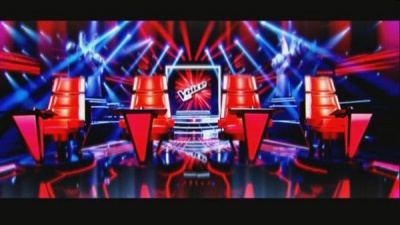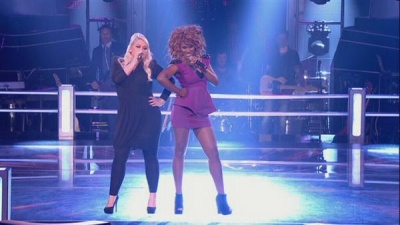The Voice UK
Contents |
Host
Holly Willoughby and Reggie Yates (2012-3)
Emma Willis and Marvin Humes (2014-)
Co-hosts
Vocal coaches:
will.i.am (all series)
Tom Jones (2012-5, 2017-)
Danny O'Donoghue (2012-3)
Jessie J (2012-3)
Kylie Minogue (2014)
Ricky Wilson (2014-16)
Rita Ora (2015)
Paloma Faith (2016)
Boy George (2016)
Jennifer Hudson (2017-)
Gavin Rossdale (2017-)
Zoe Ball (The Voice: Louder on Two, 2014)
Hacker and Dodge (The Voice UK: Hacker and Dodge Barkstage, 2015)
Broadcast
Wall to Wall and Talpa for BBC One, 24 March 2012 to 9 April 2016 (67 episodes in 5 series)
Wall to Wall and Talpa for ITV, 7 January 2017 to present
The Voice Kids
Wall to Wall and Talpa for ITV, 2017 to present
The Voice: Louder on Two
Wall to Wall and Talpa for BBC Two, 24 March to 4 April 2014 (10 episodes in 1 series)
The Voice UK: Hacker and Dodge Barkstage
Wall to Wall and Talpa for CBBC, 11 January to 9 April 2015 (9 episodes in 1 series)
Synopsis
Originating in the Netherlands, this is a singing competition with a difference (or as it's known to the rest of us, a gimmick). The judges, known as coaches, sit with their backs to each contestant as they audition, meaning the only thing they have to base their opinion on is the contestant's voice.
As with a number of talent competitions, the first stage is not broadcast and sees the hopefuls audition before the producers in the hope of impressing them, and being put through to audition in front of the coaches. Unlike other talent shows however, where contestants who perhaps aren't cut out to be singers are put through to audition for the coaches to make for so-called good TV, only contestants who can hold a tune stand a chance of being put through.
The second, and first televised stage is the blind auditions. Here the contestants, known as artists, perform on a stage in a TV studio (located at BBC TV Centre in the first series, MediaCity:UK in Salford subsequently). At the bottom end of the stage are four large red chairs, facing away from the stage towards the audience beyond. Each chair is equipped with a screen on the back indicating the coach's name, while on the front of the chair is a small desk, with a large red button. As each artist performs, the coaches listen, and if they like what they hear enough, they can hit their red button to spin their chair around, and indicate their interest in having that artist on their team. In the event no coach presses their button by the end of their performance, the artist is eliminated from the competition. If more than one coach presses their button, the power switches to the artist, and they can choose whose team they want to be on. The coaches need to be careful about when they choose to press their button as they are restricted to taking 12 artists (ten in the first series) through to the next round.
After several weeks of blind auditions, and once all four coaches have filled their teams, the next stage, the battle rounds get underway. In this stage, each coach's 12 artists are paired off, and are mentored by their coach in preparation for singing against each other. In the studio, each pair performs the same song at the same time in an attempt to vocally outshine their opponent. At the end of performance, their coach must decide who to keep on their team, and who to eliminate. For the second series a 'steal' twist was introduced at this stage. This meant that an artist who had been eliminated by their coach could remain in the competition with another coach, if one of the other coaches pressed the button on their chair within a given period of time. As with the blind auditions, if more than one coach pressed their button, the artist was able to choose. Each judge could only use their steal once, meaning they had to use it wisely.
In the first series, the artists who had won their duels in the battle rounds went straight through to the live shows. However the second series introduced a new stage, the knockout round. This round starts with each coach having seven artists, six winners of the battle rounds, and one artist stolen from another coach. Each artist performs a 'killer' song, with their coach choosing three out of their seven artists to progress to the live shows.
The final stage of the competition is the live shows. In the first series, each coach started the live shows with five artists. Across a series of four live shows, each week saw all of the artists from two of the teams perform. The first time around this resulted in the elimination of a single artist from each coach's team. The second time around two artists from each coach's team were eliminated, with the remaining two artists in each coach's team progressing to the semi-final. These artists performed again in the semi-final with one more artist from each team being eliminated, and the remaining artist progressing to the final. In the second series, each coach started the live shows with three artists, with there being just two live shows before the final. Each of the live shows saw all of the artists perform, with one artist from each coach's team being eliminated each week. In each variation, the format is constructed in such a manner that each coach is guaranteed to have one artist in the final, unlike The X Factor where a judge can reach the final with no acts left in their category. In the final each artist performs a number of songs, before the final votes are tallied, and the winner is announced. The winner receives a recording contract with Universal Music.
The third series in 2014 played out in broadly the same manner, however there were several changes in personnel. Danny O'Donogue and Jessie J left their spinning chairs behind, making way for Kylie Minogue and Kaiser Chiefs frontman Ricky Wilson. Holly Willoughby and Reggie Yates also moved on, leaving the door open for Emma Willis and ex-JLS singer Marvin Humes to take over the reins.
The series started airing in January, as opposed to its previous March airdate for the first two series. This move ended a typically tabloid-fuelled ratings battle with Britain's Got Talent. 2014 also brought in a spin-off for the final weeks of the contest. The Voice: Louder on Two began on 24 March, the Monday after the first live show. It was closely modelled on Strictly Come Dancing: It Takes Two, sharing the same 6.30 timeslot and the same host Zoe Ball.
Minor changes for the 2015 series: Kylie was replaced by Rita Ora, and Louder on Two was discontinued. Its replacement was a series of four-minute clip shows on the CBBC channel, hosted by resident stars Hacker and Dodge.
Tom Jones was not invited back for the 2016 series, and he took to the press to bemoan his bad treatment. "I was told yesterday, with no consultation or conversation of any kind, that I would not be returning." Rita Ora also left the spinning chairs, their replacements were Paloma Faith and Boy George.
BBC Loses Voice
Right from the start, the BBC had been criticised for having a nakedly commercial show on its schedule. "A complete nonsense", claimed the chairman of Channel 4. The Voice was called "insufficiently distinctive" in a government review of the BBC in 2015.
"The BBC should be banned from buying overseas formats," said ITV in 2015. Earlier that year, ITV had bought Talpa Television. The BBC's contract expired after the 2016 series, after which ITV sold The Voice to itself.
Tom Jones was brought back for the ITV series, his removal the previous year had been handled without grace. The new producers also secured the American Idol alumna Jennifer Hudson, and former Bush frontman Gavin Rossdale.
Inventor
Based on the Dutch format, The Voice of Holland, and credited as being devised by Talpa Distribution B.V.
Champions
2012 Leanne Mitchell, as mentored by Sir Tom Jones
2013 Andrea Begley, as mentored by Danny O'Donoghue
2014 Jermain Jackman, as mentored by will.i.am
2015 Stevie McCrorie, as mentored by Ricky Wilson
2016 Kevin Simm, as mentored by Ricky Wilson
Merchandise
The Voice UK: Access All Areas was on sale during series 1.
Web links
The show publicised social media: #thevoiceuk, @bbcthevoiceuk and facebook/bbcthevoiceuk




